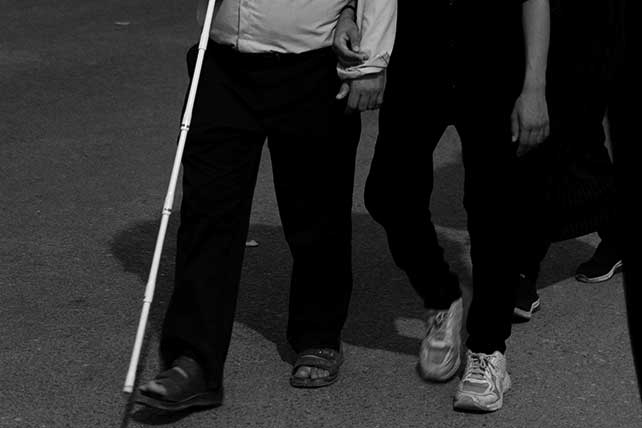Sahotra has filed an application to the office of the Model Town police superintendent to provide him with the call data record of the sub-inspector, which would show Ayub’s location at the time of the alleged crime, he said.
“In case the trial court does not grant bail to Masih, we will move the Lahore High Court, which will surely take these facts into consideration,” he added.
RELATED: Christian Charged With Blasphemy Under Pakistan’s Terrorism Law
Sahotra confirmed Masih’s claim that he was tortured by police while in custody.
“It is very unfortunate that a blind person was subjected to such inhumane treatment by the police,” he said. “We hope that the government and the senior police officials will take notice of this high-handed behavior by their personnel and take disciplinary action against them.”
Naeem Yousaf, executive director of the Catholic Church’s legal advocacy group, the National Commission for Justice and Peace (NCJP), condemned the unjust arrest of a blind man on a charge as serious as blasphemy.
“Masih kept going all these years despite being a target of harsh social attitudes that fail to recognize disabled people as human beings,” he said. “Already burdened by poverty, blindness and social cruelty, he is now suffering even more behind the bars of a jail cell, a victim of injustice and human indifference.”
Pakistan’s blasphemy laws have been systematically misused to target religious minorities, dispossess the poor and settle personal and economic disputes, Human Rights Watch stated in a June 9 report.
“Blasphemy accusations are increasingly weaponized to incite mob violence, displace vulnerable communities and seize their property with impunity,” states the 29-page report, “A Conspiracy to Grab the Land: Exploiting Pakistan’s Blasphemy Laws for Blackmail and Profit.”
In several cases, blasphemy accusations were used to target business rivals or coerce property transfers, according to the report. It added that the law’s broad and vague provisions allow it to be exploited with minimal or no evidence, creating a climate of fear among vulnerable groups.
HRW criticized Pakistan’s criminal justice system for enabling these abuses. Authorities rarely hold perpetrators of mob violence accountable, while police often fail to protect the accused or investigate allegations, it stated.
In some instances, officers who intervene face threats themselves. Political and religious actors accused of inciting violence frequently escape arrest or are acquitted due to lack of political will or intimidation.
Pakistan ranked eighth on Open Doors’ 2025 World Watch List of the 50 countries where it is most difficult to be a Christian.
© 2025 Christian Daily International-Morning Star News. Articles/photos may be reprinted with credit to Christian Daily International-Morning Star News. https://morningstarnews.org

